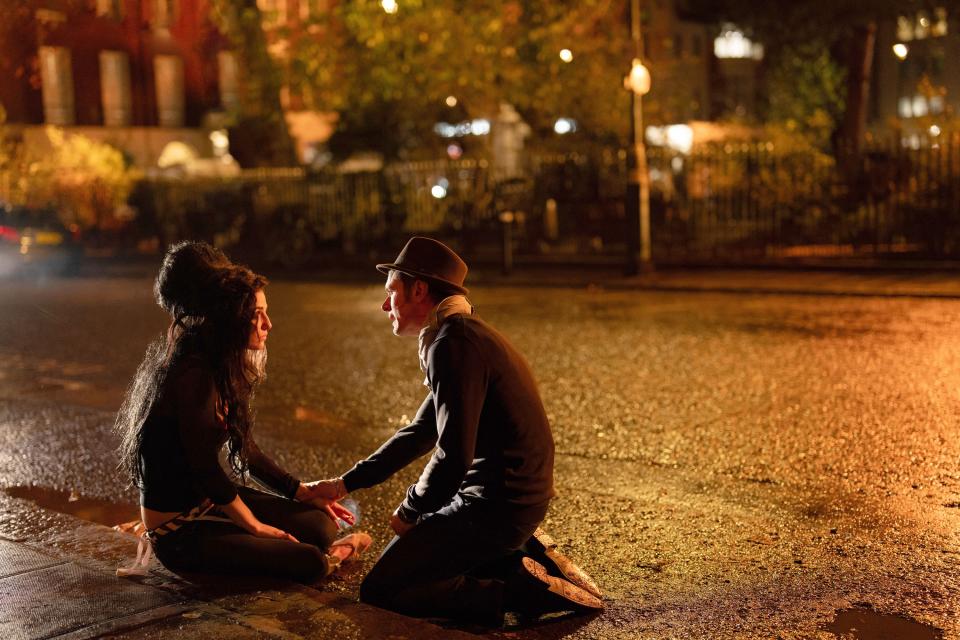Marisa Abela Turned to Therapy Techniques to Play Amy Winehouse in ‘Back to Black’

To transform into the famed “Rehab” singer, Marisa Abela realized she had to rehabilitate Amy Winehouse’s memory herself with the help of modern therapy.
The “Back to Black” lead was faced with dismantling the assumptions of Winehouse’s legacy and the media judgments upon her love life, drug use, and death at age 27 after being cast in the buzzy yet assumedly controversial biopic. The Winehouse fan backlash began as soon as Abela was announced to be portraying her; paparazzi stalked the set, and tabloids dove into viral clips of Abela singing in character, only to debate whether or not she looked like Winehouse onscreen, let alone sound like her.
More from IndieWire
It’s proof that the lore surrounding Winehouse more than a decade after her passing is still too easily slotted into certain judgments in the zeitgeist: tortured artist, lovesick wife, impulsive addict, victim of men. And how can one person play all of that for one film? Heck, how could one person even endure all of that when Winehouse was alive?
Abela was steadfast in wanting to capture Winehouse without labels at all. In an interview with IndieWire, Abela recalled her research process and trying to find the “intention” behind Winehouse’s seemingly eccentric actions, particularly her relationship with ex-husband Blake Fielder-Civil.
“The truth is when you watch videos of Amy talking about [the album] ‘Back to Black,’ so much of the footage that I was watching in my research was her saying like, ‘You know, I’d give it all up tomorrow if it meant that like I could go home and make Blake a cup of tea,'” Abela told IndieWire. “For me as an actor, it’s not about judging that. It’s about thinking why? What is the intention? Is the intention ‘I want to be with Blake’ or is the intention ‘I want Blake to love me’? And I think that the places that you do have control as an actor is deciding what those intentions are.”
As part of her immersive process of transforming into Winehouse, Abela applied therapy techniques to the posthumous fictionalization of the late Grammy winner’s story.
“I didn’t necessarily want to play everything as just ‘I want to love Blake, I want to serve Blake, I want to see Blake.’ It was the intention of ‘I want to be loved. I don’t want to be alone. I don’t want to feel scared.’ Those intentions aren’t necessarily linked to just putting it on the other person. There’s power in that,” Abela said. “I think that Amy’s super-objective in life was to be loved. And she, I think, felt that the love that was missing most as a child was a love from a man. I think that there’s a temptation as a young girl to think, like, ‘I’m going to never let any man not love me again,’ and I think that’s what happened. I think that she was sort of seeking that male relationship that was going to make her feel safe and loved and whole, and she was willing as a woman to to give over her power in her relationships. And that’s just a survival thing. That’s brain chemistry, that’s psychology.”

And while “it was a different time” when Winehouse was alive, Abela harnessed that therapized approach to bringing Winehouse’s memory to the screen. “In therapy, if you finally understand why you do something like a toxic cycle, it’s easier to unpack, and the job of an actor is to have empathy for a character and not judge that person while you’re playing them,” Abela said. “That’s how I felt, personally.”
The “Back to Black” production had a well-being coordinator on set but Abela implied that she didn’t utilize the therapist to further connect with Winehouse.
“To be honest, I just so needed to be in that headspace at the time,” Abela said. “It is a weird part of the job when you do leave set, like you are pretty numb, there’s not much space left for you as a person, you’re just working through someone else and afterwards, it’s OK. You can unpack it and you can figure it out — unless obviously you need help, and then you get it. But the most important thing to me in that period of time was just serving the story well, and it just doesn’t feel like it’s in any way about you. I guess you separate yourself from the thing, and then when you go home, you are pretty numb, but when you’re in it, you’re fully in it.”
But Abela did not “go Method” to portray Winehouse. In fact, that wouldn’t leave space for Winehouse herself and would be too much about Abela trying to become Winehouse, a meta commentary that undercuts the colloquial understanding of Method acting. In short, being Method is more about the actor than about the person the actor is playing, according to Abela. And it makes sense, especially given Abela’s star-making performance.
“I think when it gets difficult is if you’re a Method actor, for example, and you need to feel it yourself when you go home in order to feel it on set the next day. I mean, that must be very challenging to get out of,” Abela said. “If I got Amy as a fictional character, I would do it. It’s the story that I fall in love with, the person that I fall in love with, then it doesn’t really matter if they existed in real life or from someone’s imagination.”
So yes, Abela is open to taking on another biopic. “I think it comes with a lot of pressure, but you just can’t … I’m hell-bent on the fact that, like, fear can’t get in the way of telling a story that someone wants to tell,” Abela said. “So I guess I would if the story was right.”
Focus Features will release “Back to Black” in theaters on Friday, May 17.
Best of IndieWire
The 13 Best Thrillers Streaming on Netflix in May, from 'Fair Play' to 'Emily the Criminal'
The Best Father and Son Films: 'The Tree of Life,' 'The Lion King,' and More
The 10 Best Teen Rebellion Films: 'Pump Up the Volume,' 'Heathers,' and More
Sign up for Indiewire's Newsletter. For the latest news, follow us on Facebook, Twitter, and Instagram.

 Yahoo News
Yahoo News 
